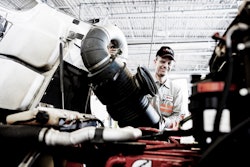Trucking news and briefs for Friday, June 3, 2022:
ATA calls on Biden administration to take action to lower diesel prices
The American Trucking Associations on Thursday published a blog calling on Washington to take action to lower the price of diesel at the pumps. The group said when fuel costs rise, so do the costs of everything else. “Inflation can’t be controlled without some relief in price of diesel,” ATA said.
“Right now, motor carriers are getting slammed by nightmarish surges in the price of diesel,” ATA said. “It’s especially hard on smaller fleets, which don’t operate at a scale to negotiate rates down or lock prices into a contract. These small businesses account for 97% of trucking companies in the U.S., running 20 trucks or fewer.”
To help solve the problem of soaring diesel prices, ATA calls on Washington to take the following actions:
- Utilize the oil and natural gas found in the Gulf of Mexico by expediting lease sales and permits for offshore energy production
- Fast-track onshore oil and natural gas permitting to spur expanded production
- Announce realistic leasing and development opportunities for onshore and offshore energy
- Expedite permitting for pipelines and other energy infrastructure
- Encourage expedited carbon capture and sequestration rulemaking to ensure that America remains a world-leader in emissions reduction
[Related: New York governor suspends fuel tax]
The group also noted that while battery-electric and hydrogen fuel cell trucks are on the horizon, “decarbonization of the freight sector cannot be realized overnight.”
“Forcing it before it makes economic and technological sense will not accelerate its arrival but instead prolong it,” ATA added. “A large tractor-trailer traveling 100,000 miles per year consumes as much electricity as 18 homes or 44 electric cars. There is simply not enough power on the grid to electrify America's future truck and car fleets, let alone the charging infrastructure.”

ATA also said emissions from new trucks today have been reduced by more than 98% over the last 30 years, noting it would take 60 of today’s clean diesel trucks to equal the emissions of one truck sold in 1988.
“So, as we keep an eye toward the future, it’s imperative that policymakers stay focused on the here-and-now,” the group concluded. “The energy crisis facing motorists and truckers today is compounding a supply chain crisis. The elevated price of diesel now threatens to slide our economy back into recession. We need to expand domestic energy production, and fast.”
[Related: A fuel crisis is here -- will only the strong survive?]
FMCSA awards nearly half-billion in grants to curb rising highway fatalities
With fatalities involving commercial motor vehicle crashes increasing sharply, according to the Federal Motor Carrier Safety Administration, the agency on Thursday announced that it would award more than $463 million in grants to states to reduce CMV-involved crashes, fatalities and injuries through commercial vehicle-focused safety programs. The amount represents a 52% increase in funding from last years, which Transportation Secretary Pete Buttigieg said was made possible with "resources available through the President's Bipartisan Infrastructure Law."
FMCSA’s Motor Carrier Safety Assistance Program (MCSAP) grants provide funding to state and local law enforcement and other government agencies for safety inspections of trucks, investigations of motor carriers in response to safety concerns and audits of new trucking companies “to reinforce the importance of responsible operation and ensure the safe movement of goods and passengers in the U.S. economy,” FMCSA said.
The grants come after a significant rise in fatalities involving large trucks. In preliminary 2021 data from the National Highway Traffic Safety Administration, there was a 13% increase in fatalities from 2020. Earlier this year, DOT announced the National Roadway Safety Strategy (NRSS) to address traffic fatalities and serious injuries by adopting the “safe system” approach, which focuses on safer roads, safer people, safer vehicles, safer speeds, and better post-crash care. These grants will also help DOT implement the NRSS, FMCSA added.
All 50 States, the District of Columbia, and the U.S. territories of American Samoa, Guam, the Northern Mariana Islands, Puerto Rico, and the U.S. Virgin Islands will receive federal funds.
[Related: Traffic deaths reach 16-year high, NHTSA estimates]
Volvo adds dual PTO to I-Shift automated manual transmission
Volvo Trucks North America announced it is upgrading its I-Shift automated manual transmission.
I-Shift now offers a dual power take-off (PTO) that expands the efficiency benefits, transmission functionality and overall cost savings, Volvo said.
The new dual PTO allows I-Shift to incorporate two independently clutched DIN 5462 drives, or one SAE 1410 flange and one DIN 5462 drive, separated by the vehicle’s centerline. By separating the two drives, space is created to allow for the installation of two pumps, simplifying installations and serviceability in the field. The output drives are independently clutched, enabling the vehicle to serve applications either separately or simultaneously.
“Leveraging the new capabilities of a dual PTO in Volvo’s I-Shift transmission increases the truck’s operational versatility, a customer can haul portland cement one day and aggregate material the next,” said Andy Hanson, product marketing manager at Volvo Trucks North America. “Volvo’s factory-installed PTOs and pumps make the up-fitting process easier, increasing first-time quality and overall reliability for our customers.”
The I-Shift transmission with the dual PTO improves functionality, productivity, fleet utilization and versatility, Volvo said, and also compliments the existing single, double and triple PTO suite of offerings.
The PTO’s factory supplied DIN 5462 ports and SAE 1410 flanges are interchangeable with the SAE 1310 flange and SAE-C and SAE-BB ports, which are all offered through Volvo’s parts distribution network. The factory-installed dual PTO, which carries the same warranty as the I-Shift transmission, also includes dash switches to provide independent left and right side control. Volvo-installed PTOs can also receive factory installed Parker gear and piston pumps.
An expanded benefit of the I-Shift transmission is that it comes in 12, 13 and 14-speed configurations. I-Shift is also available with an overdrive gear and crawler gears of either 17.5:1 or 32:1, providing the ability to cruise at highway speeds while still allowing for excellent efficiency, “startability” and slow-speed maneuverability.










